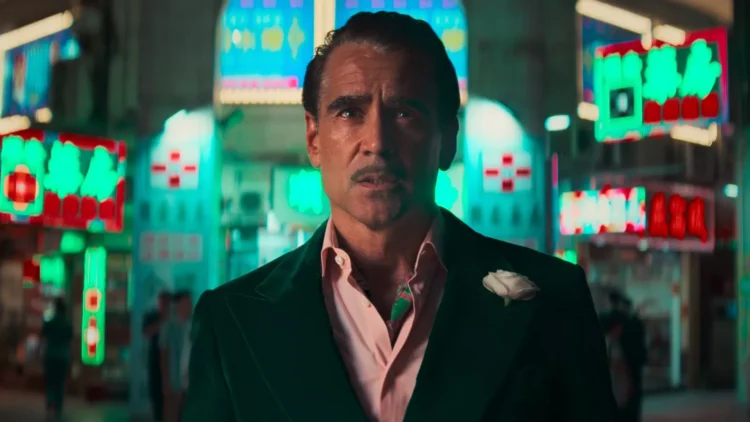German director Edward Berger returns to the big screen after the Oscar‑nominated Conclave, this time with a visually striking but narratively flimsy adaptation of Lawrence Osborne’s 2014 bestseller Ballad of a Small Player. The film places Colin Farrell at its centre, portraying a slick, sweat‑soaked con‑artist who flees mounting gambling debts in the neon‑lit streets of Macau. While Farrell’s nuanced turn and the film’s sumptuous visuals receive high marks, the underlying story fails to deliver the tension expected of a psychological thriller.
The opening sequence sweeps over Macau’s glittering nightscape, a constellation of casino towers and LED billboards. The camera then narrows to a lavish penthouse where Lord Doyle (Farrell) lies splayed amid shattered champagne bottles and discarded room‑service trays—visual shorthand for his hedonistic excess. After a brief, self‑indulgent grooming routine—shaving a pencil‑thin mustache and slipping into a velvet‑green suit that shouts “peacock”—a sharp knock interrupts his reverie. A terse note slides under the door, reminding him of the colossal bill he cannot pay.
Attempting to slip out unnoticed, Doyle is confronted by Mr. Huang (Jason Tobin), the hotel’s manager, who bluntly outlines the debt and threatens to involve the authorities should the gambler try to flee. Doyle promises a London banker will wire the money the next business day, a reassurance that does little to appease Huang’s growing impatience.
Undeterred, Doyle wanders the rain‑slicked streets to another casino, convinced his legendary baccarat skills will reverse his fortunes. Unseen, a mysterious woman—played by Tilda Swinton—tails him as he pleads for credit to sit opposite the dreaded “Grandma” (Deanie Ip), a veteran card shark whose bankroll is as deep as her reputation. Throughout, Berger keeps the camera tightly glued to Doyle’s perspective, employing saturated hues and intimate close‑ups that mirror the protagonist’s frantic inner world.
Fala Chen appears as Dao Ming, a seasoned casino hostess who extends credit to the city’s self‑styled high rollers. She recognizes the perilous edge on which addicts teeter and, despite the moral ambiguity, offers Doyle a lifeline. Her motives remain opaque—does she pity a broken soul, or merely see an opportunity for personal gain? This ambiguity underscores the film’s central question: can a man steeped in deceit ever be redeemed?
Farrell infuses Doyle with a paradoxical charm. He never lets the character become a cold‑blooded predator; instead, he renders him oddly earnest, a man desperate for aristocratic validation even as sweat drips from his trembling hands. Each card he lifts becomes a visual metaphor for a step toward either salvation or ruin, and Farrell’s performance succeeds in humanizing a figure who would otherwise be unlikable.
Unfortunately, the movie squanders this compelling lead. The supporting storylines unfold sluggishly, and the promised climactic twist feels telegraphed from the first act, arriving with little impact. Doyle’s eventual “moment of clarity” feels contrived rather than cathartic, and the resolution is predictable enough that the audience can see it coming minutes earlier. The film relies heavily on visual contrast—glittering casino floors against sprawling trash‑strewn alleys—to imply depth, but the editing choices favor style over substance, leaving critical narrative threads underdeveloped.
In summary, Ballad of a Small Player shines when it showcases Macau’s opulent façade and Farrell’s magnetic performance, but it falters as a thriller due to a thin script and uneven pacing. The picture is currently enjoying a limited theatrical run before its Netflix debut on October 29.























